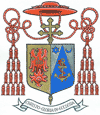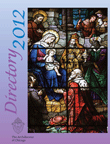
The Cardinal's Column
Francis Cardinal George, O.M.I.
Religion, reason, violence
Cardinal George's Schedule
- October 1: 9:30 a.m., Catholic Lawyers Guild Red Mass, Holy Name Cathedral, 2:00 p.m., 100th Anniversary Mass, Holy Trinity Polish Mission
- October 2: 10:00 a.m., Episcopal Council Meeting, Residence; 5:15 p.m., National Catholic Development Conference Mass, Holy Name Cathedral.
- October 4: 6:30 p.m., Illinois Catholic Health Association Dinner
- October 5: 12:00 p.m., Provincial Bishops Meeting
- October 6: 10:00 a.m., Catholic Conference of Illinois; 6:30 p.m., Stop-by St. Mary of Czestochowa School Benefit
- October 7: 2:00 p.m., Equestrian Order of the Holy Sepulchre of Jerusalem Investiture Mass; 7:00 p.m., Fr. Augustus Tolton Awards Banquet
- October 8: 9:30 a.m., 100th Anniversary Mass, Our Lady of Victory, 2:00 p.m., Equestrian Order of the Holy Sepulchre of Jerusalem Mass, St. Patrick’s, Lake Forest
- October 10: 8:30 a.m., Big Shoulders Fund Lend-A-Shoulder Day; 6:00 p.m., The Lumen Cordium Society Cardinals’ Guild Dinner
- October 12: 5:00 p.m., The Lumen Cordium Society Benefactors’ Reception
- October 14 - 21: United States Conference of Catholic Bishops (USCCB) Fall Dicastery Visits, Rome

Last September 12, Pope Benedict XVI lectured at the University of Regensburg in Bavaria on the relation between faith and reason. His argument was straightforward: faith without reason will often lead to violence; and contrariwise, reason without faith will often lead to violence. Therefore, if we want to live in a peaceful world, faith and reason must be in dialogue not only in particular cultures but globally.
Few of the commentaries on what he said have addressed his full remarks. Instead, his quoting part of an argument between an emperor, who was a man of Orthodox Christian faith also schooled in Greek philosophy, and a Persian Muslim philosopher was used to say that the Pope meant primarily to condemn Islam’s use of violence. Muslims were insulted and secularists said pointedly that the Pope has no room to talk since Christianity has also been used to countenance violence in its history. Both responses ignored what this Pope and his predecessor have often said: reason cut loose from faith closes in on itself and opens the world to violence. God is supremely rational and we are made in his image. What is irrational in itself is against God’s nature and ours. Today, of course, it would be pointed out that what is irrational is itself a matter of dispute. It’s obvious to me that “gay marriage” is an irrational concept, like a square circle; others see it as a civil right. Conversation to clarify presuppositions is necessary to avoid violence.
If someone asks about religiously inspired violence, many can think of examples. The most tragic such example for our country was the attack on New York and Washington, D.C., five years ago, executed in the name of God. These acts of terrorists were correctly understood as attacks on all Americans. In the universal Church, the upcoming feast of the Holy Rosary on October 7 commemorates the victory in 1571 of the Christian fleet over the Muslim sea forces that had threatened Christians in the Mediterranean for centuries. Religiously inspired violence is part of many histories, but Americans generally have felt that wars of religion were a thing of the past, until recently.
By contrast, if someone were to ask about violence inspired by reason, few would understand the question and many would insist that secularist rationalism (reason which deliberately excludes faith as a source of knowledge and truth) could not foster violence. But, again, history is instructive. The first great rationalist revolution, the French Revolution of 1789 that shaped the modern history of Europe, enshrined the Goddess of Reason on the desecrated altar of Notre Dame Cathedral in Paris and proceeded to institute terror in the name of Reason. Rationalist secular utopias, especially those inspired by the last great Enlightenment thinker, Karl Marx, have been responsible for more violence and death than any religion in the history of the human race.
Faith without reason (fundamentalism) can lead to violence; reason without faith (rationalism) can lead to violence. In a healthy culture, faith is open to rational critique and reason has been opened to the horizons that revealed religion teaches. Perhaps because many Americans don’t often think of reason as a source of violence nor of religion as a source of truth, the plea for a marriage of faith and reason has yet to be discussed. Without such dialogue, the Pope believes that secularist cultures will be isolated from religious cultures, and the mutual understanding necessary for peace will escape us.
Speaking this week to the ambassadors accredited to the Holy See from Muslim countries, Pope Benedict said: “In a world marked by relativism and too often excluding the transcendence and universality of reason, we are in great need of an authentic dialogue between religions and between cultures, capable of assisting us…to overcome all the tensions together.” I believe we have such a dialogue in Chicago, and I trust that we can continue to build up this society together. I also believe that the dialogue between Catholics and Muslims here can help open American culture to other nations that are not secularist in their thinking and living. A dialogue of cultures can prevent a clash of civilizations.
The clash of civilizations within our own country is sometimes called a culture war. One dividing line in that cultural tension concerns how people understand what it means to respect human life. The divide separates believers and secularists. The Church’s annual celebration of Respect Life Sunday during the month of October therefore brings its own tensions to our life of faith, for we live in our culture as well as in our Church. I hope that every parish and each priest and parishioner can enter prayerfully into the mystery of human life as a gift from God and then move out of this month with strengthened faith and clearer reasons for the defense of every human life at every stage of development.
A last thought concerns the launching this week of a third official Archdiocesan newspaper. Besides the Catholic New World, the Archdiocese publishes Catolico for Spanish-speaking Catholics. These two newspapers are now joined by Katolik for Polish-speaking Catholics. So far as I know, our Archdiocese is the only one in the country to have an official Polish language newspaper. I am proud of that fact and grateful to the Polish community for supporting this new paper. We welcome its beginning and pray for its success.
May God bless all of us.
Sincerely yours in Christ,
Francis Cardinal George, OMI
Archbishop of Chicago



